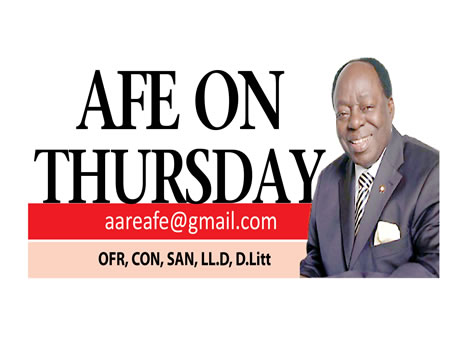THE killing of George Floyd by officers of the Minnesota Police Department has taken center stage in international online news and print media, and has equally sparked numerous protests across the world by several people – blacks and whites alike – standing in solidarity against relentless police brutality in the United States of America, particularly against blacks, with widespread chants of the mantra, “Black Lives Matter”. Nigerians have also shown keen interest in the development and particularly the legal consequences attached to the killing as in Nigeria Police brutality and unlawful killing of innocent and unarmed citizens has almost become a way of life. Particularly, the decision to firstly charge the officer directly responsible for the killing with third degree murder, before it was upgraded to second degree murder is one that many Nigerians have found confusing considering that similar killings in Nigeria normally attract a charge of murder. Therefore in this edition, I will consider the legal perspectives of the killing of George Floyd, with particular reference to the Nigerian and Minnesota State criminal law jurisprudence.
The facts we know so far
On 25th May, 2020, George Floyd purchased cigarettes at a grocery store in a neighbourhood of Minneapolis, Minnesota. The store employee believed that Floyd had paid with a counterfeit $20 bill. Later on, two of the employees left the store, crossed the street, and approached Floyd in his SUV parked across the store. The employees demanded that Floyd return the cigarettes and when the latter refused, the employees called the police. Shortly after, two officers, Kueng and Lane, arrived and following a brief struggle, the officers pulled Floyd from the SUV and handcuffed him. Upon the arrest, Floyd cooperated with the officers and showed no sign of resistance, but he added that he was claustrophobic and that he did not want to sit in the police car. Not long after, another police car arrived with officers Chauvin and Thao. Upon arrival, officer Chauvin assumed command, being the most senior in rank and the field training officer for both Lane and Kueng, who had both not yet completed their first week of active duty.
In the process of forcing Floyd into the police car, Floyd, still handcuffed, fell to the pavement where he laid on his chest, cheek to ground. Chauvin then knelt on Floyd’s neck, Kueng applied pressure on Floyd’s torso, Lane applied pressure on Floyd’s leg, while Thao stood nearby, preventing bystanders from intervening. During this encounter, Floyd reportedly stated several times that ‘I can’t breathe’ for at least 16 times. At a point, Floyd pleaded for his life, reportedly stating, ‘please don’t kill me’. Chauvin knelt on Floyd’s neck for eight minutes, 46 seconds. When Floyd appeared unconscious, bystanders confronted the officers about Floyd’s condition but in response, Chauvin pulled out a self-defence spray to keep the people away while officer Thao prevented the bystanders from approaching Chauvin. The officers subsequently called for an ambulance and despite this, Chauvin continued to kneel on Floyd’s neck. Despite the arrival of Emergency Medical Technicians, Chauvin still kept his knee on Floyd’s neck for about a minute, despite Floyd being silent and motionless. Floyd was eventually loaded into the ambulance and was pronounced dead upon arriving at the destined medical facility.
A medical autopsy found that George Floyd’s death was a homicide caused by a cardiopulmonary arrest while being restrained by the police officers who subjected Floyd to neck compression. A second autopsy confirmed that the death is homicide caused by asphyxiation due to the compression of the neck, which affected blood flow and oxygen going into the brain, and also from the compression of the back which interfered with breathing. The second autopsy further revealed that Floyd had no underlying medical condition that contributed to his death and that ‘being able to speak does not mean that someone is able to breathe’.
Arrest and criminal charges
Following the death of Floyd, all four officers were fired the following day. Chauvin, who knelt on Floyd’s neck for almost 9 minutes, was arrested on 29th May and was initially charged with third-degree murder and second-degree manslaughter. He was remanded at Oak Park Heights State Prison. However, on 3rd June, his charge was upgraded to second-degree unintentional murder. The three other officers were charged with aiding and abetting second-degree unintentional murder as well as aiding and abetting second-degree manslaughter. In essence, the four police officers were charged with different offences in the death of George Floyd.
Under Minnesota Criminal jurisprudence, third-degree murder with which Chauvin was initially charged involves killing another person without premeditation and intent to kill. It generally encompasses unintentional murders and certain drug-related deaths. Chapter 609, Section 609.195 of the 2019 Minnesota Statutes prescribe a sentence not exceeding 25 years for third-degree murders. Second-degree manslaughter, also with which Chauvin was initially charged, involves reckless or negligent actions which result in the death of a person. Chapter 609, Section 609.205 of the 2019 Minnesota Statutes prescribes a term of imprisonment not exceeding 10 years, or payment of a fine not more than $20,000, or both.
However, Chauvin’s charge was upgraded to unintentional second-degree murder under the felony-murder doctrine, alleging that Chauvin killed Floyd in the course of committing assault in the third degree. Unintentional second-degree murder in Minnesota connotes that the death of a human being was caused, without an intent to kill, in the process of committing or attempting to commit a felony. The felony in Floyd’s case is the assault. Therefore, unintentional death which occurs as a result of an unlawful assault amounts to second-degree murder in Minnesota. Chapter 609, Section 609.19 of the 2019 Minnesota Statutes prescribes an imprisonment sentence not exceeding 40 years for the offence of unintentional second-degree murder. Conversely, first-degree murder in Minnesota has an element of premeditation. Where a person is convicted of first-degree murder, the killing must have been intentional. Chapter 609, Section 609.185 of the 2019 Minnesota Statutes prescribes mandatory life imprisonment for a person convicted of first-degree murder.
The Nigerian perspective
Under the Nigerian criminal jurisprudence, there is a general rule which prohibits the joinder of offenders in a criminal action. Generally, only one defendant must be charged in a charge sheet for an offence committed by him. However, there are exceptions to this rule, one of which is that when more than one person commits different offences in the course of the same transaction, they may be charged and tried together. When then can it be said that different persons have committed an offence in the course of the same transaction? To answer this poser, due regard is always had to whether such individual offences are geared towards realizing a common purpose, considering the proximity of place, time difference and overt/covert actions. In proper perspective, when a person is accused of committing an offence and another of abetting or being accessory to the same offence, the two of them may be charged together for the principal offence.
From the facts of the George Floyd’s death, evidence shows that while Chauvin knelt on Floyd’s neck, Kueng and Lane restrained Floyd’s torso and leg respectively, while Thao prevented bystanders from intervening. This is akin to a rape case wherein someone did the penetration while two other people restrained the victim, and someone else stood by the doorway to prevent external interference. In both instances, all the participants committed different actions towards the realisation of the same objective; and in Floyd’s case, murder. In Nigeria, Chauvin, Kueng, Lane and Thao would have rightly been charged for the offence of the murder of George Floyd. However, as seen, all four police officers were charged differently in the offence. I am of the firm opinion that the position of the law in Minnesota ought to be reviewed to confer joint liability for a principal offence on every person who played a role, however minuscule, in the commission of the offence.
Another consideration is the issue of intention – which differentiates first, second, and third-degree murders in Minnesota. It equally differentiates between murder and manslaughter in Nigeria. However, criminal jurisprudence in Nigeria, which is premised on English common law as espoused in DPP v. Smith (1961) AC 290, is to the effect that a person is taken to foresee or intend the natural and probable consequences of his acts. In the Smith case, Jim Smith was ordered by a police constable to stop his car which contained stolen goods. However, he accelerated instead. The police constable jumped onto the car, but fell off and was killed by another oncoming car after Smith violently swerved the car. Smith was convicted of murder. Although the Criminal Court of Appeal substituted a verdict of manslaughter, the House of Lords, on further appeal, upheld the conviction of murder initially imposed by the trial court.This was because it was held that falling off the car and getting killed by another oncoming car was a natural consequence of Smith’s action of violently swerving the car.
In George Floyd’s scenario, evidence exists that Chauvin knelt on Floyd’s neck for about nine minutes. Objectively, this action is capable of killing, and forensic investigations revealed that indeed, Floyd died from asphyxiation due to the compression of the neck, which affected blood flow and oxygen going into the brain. Without a doubt, asphyxiation as eventually hoaxed to Floyd was a natural consequence of kneeling on someone’s neck for several minutes as done to him by Officer Chauvin. Therefore, under the Nigerian criminal jurisprudence, the appropriate charge for all four police officers would have been a charge of murder as a person is deemed to intend the natural consequences of his actions.
Indeed, there have been several Nigeria cases where trigger-happy police officers have been arrested, tried, convicted and sentenced to death for the murder of innocent civilians. Therefore, I believe that the position of the Nigerian law is much preferable to Minnesota’s and if a stronger punitive measure such as that which obtains in Nigeria is put in place, perhaps, it will serve as a strong deterrent in curtailing the spate of police brutality in the United States of America.
AARE AFE BABALOLA SAN, CON
YOU SHOULD NOT MISS THESE HEADLINES FROM NIGERIAN TRIBUNE
BREAKING: APC Names Ajimobi Acting Chairman
The National Working Committee (NWC) of the ruling All Progressives Congress (APC), on Tuesday, announced Senator Abiola Ajimobi as its acting National Chairman. This followed affirmation of the suspension of National Chairman of the party, Adams Oshiomhole, by an Appeal Court… Read Full Story
FG Threatens To Sack Striking Doctors As Meeting Ends In Deadlock
Following the failure of the marathon meeting between the Federal Government and the doctors under the auspices of National Association of Resident Doctors (NARD) to reach a compromise, the government on Tuesday threatened to sack all striking doctors who fail to report to work on Wednesday… Read Full Story
I’ll Protect Children Against Sexual Violence ― Buhari
President Muhammadu Buhari has pledged the commitment of the government to protect children from sexual violence, domestic abuse and exploitation as Nigeria join the international community to celebrate the Day of the African Child… Read Full Story
Osinbajo’s Committee Did Not Call For Suspension Of NYSC ― Laolu Akande
Contrary to reports circulating in the mainstream media, Vice-President Yemi Osinbajo did not call for the suspension of the National Youth Service Corps (NYSC), Tribune Online reports. Osinbajo’s Senior Special Assistant on Media and Publicity, Laolu Akande, made this known on Tuesday on Twitter… Read Full Story
Attempt To Link Me With Naira Marley’s Flight Ridiculous ― Fashola
The Minister of Works and Housing, Babatunde Fashola on Tuesday described as ridiculous, attempts to link him with a flight that conveyed hip-hop star, Azeez Fashola is popularly known as Naira Marley, to Abuja for a concert last… Read Full Story
Nigeria Lost N27.5bn To Oil Pipeline Vandalism In 2018 ― Audit Report
The newly published oil and gas 2018 audit report has revealed that a total of N27.551billion was lost to pipeline vandalism within the year. It stated that a total of 1,894 breaks were recorded with a loss of 204,397.07 cubic metres of crude product… Read Full Story
WATCH TOP VIDEOS FROM NIGERIAN TRIBUNE TV
- Relationship Hangout: Public vs Private Proposals – Which Truly Wins in Love?
- “No” Is a Complete Sentence: Why You Should Stop Feeling Guilty
- Relationship Hangout: Friendship Talk 2025 – How to Be a Good Friend & Big Questions on Friendship
- Police Overpower Armed Robbers in Ibadan After Fierce Struggle






